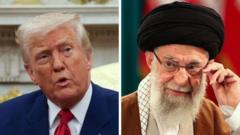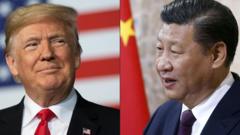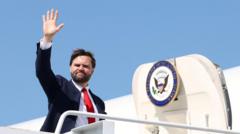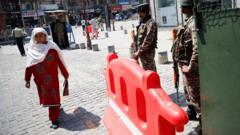The anticipated fourth round of nuclear negotiations between Iran and the US has been postponed due to logistical issues, according to Oman’s foreign minister. This delay comes in the wake of American warnings and sanctions against Iran, intensifying doubts about the viability of the discussions.
Fresh Delay in Iran-US Nuclear Negotiations Raises Concerns

Fresh Delay in Iran-US Nuclear Negotiations Raises Concerns
Oman's mediation efforts are hampered as Iran-US nuclear talks face postponement amid rising tensions and new US sanctions.
Amid growing tensions, a planned fourth round of negotiations aimed at addressing Iran's nuclear program has been postponed. The foreign minister of Oman, which is facilitating the talks, announced that the Rome discussions originally scheduled for Saturday have been delayed due to logistical reasons, with a new date to be determined later.
This setback follows recent comments from US Secretary of Defense Pete Hegseth, who cautioned that Iran would "pay the consequences" for its support of the Houthi rebels in Yemen. Additionally, the US imposed new sanctions this week targeting companies allegedly connected to Iran, further complicating the atmosphere surrounding the negotiations.
In 2018, President Donald Trump unilaterally withdrew the US from a previous nuclear agreement with Iran and several other world powers, promising to forge a "better" deal. Since the onset of these negotiations in April, both nations described initial discussions in Muscat as "constructive." However, Iran’s foreign ministry confirmed that the most recent round of talks has been delayed, while the US government has yet to issue an official statement regarding its participation.
Reports suggest that the postponement does not signify a breakdown in communication, as both nations are keen to avert escalations toward military action. Nonetheless, skepticism about the negotiations is reportedly growing in Tehran due to the new sanctions and what officials describe as conflicting positions taken by the US delegation.
The sanctions, which are part of Trump’s "maximum pressure" strategy against Iran, aim to restrict the regime’s funding for destabilizing activities in the Middle East, including support for groups deemed terrorist proxies. A statement from the US State Department underscored the stance that Iran’s actions continue to fuel conflict in the region.
Recent social media activity from US officials has also amplified tensions, with stark warnings directed at Iran regarding its military support for the Houthis. While Trump expresses a desire for a solution that constrains Iran's nuclear ambitions, there are factions within his administration advocating for the total disassembly of Iran’s enrichment capabilities.
In response, Iran maintains that its nuclear program serves peaceful purposes and asserts its right to pursue enrichment. The nation hopes for a balanced agreement that allows them to limit their nuclear ambitions in exchange for a reprieve from the extensive sanctions that have hindered its economy, especially as it navigates one of the most stringent sanctions regimes globally.



















